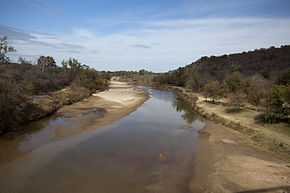Goodbye to a River

Goodbye to a River is a book by John Graves, published in 1960.[1] It is a "semi-historical" account of a canoe trip made by the author during the fall of 1957 down a stretch of the Brazos River in North Central Texas, between Possum Kingdom Dam and Lake Whitney. The book presents both the author's account of the trip itself and numerous stories about the history and settlement of the area around the river and of North Central Texas. The title refers to Graves' childhood association with the river and the country surrounding it, and his fear of the "drowning" effect that a proposed series of flood-control dams (most notably, Lake Granbury) would have on the river.
Only three of the dams were built on the river, but at one time up to thirteen were proposed at various locations along its course to the Gulf of Mexico. The success of Goodbye to a River is often cited as a major reason that the proposed dams were never built.
The book is acclaimed as a work of both conservationism and history and has been compared to Walden by Henry David Thoreau.[2]
For the 2007-2008 academic year, Texas State University-San Marcos selected Goodbye to a River as the core text for its University Seminar, a course required of all first-year students.
References
- ↑ "SWWC dedicates Oliphant Statue “The Writer John Graves”". Texas State University. Retrieved 2009-01-24.
- ↑ "About Goodbye to a River". Retrieved 2009-01-24.
External links
- Dick Holland (2000-11-10). "Goodbye to a River: Behind the Scenes". The Austin Chronicle. Retrieved 2009-01-24.
- Fifth Triennial Helen Warren DeGolyer Competition and Exhibition for American Bookbinding